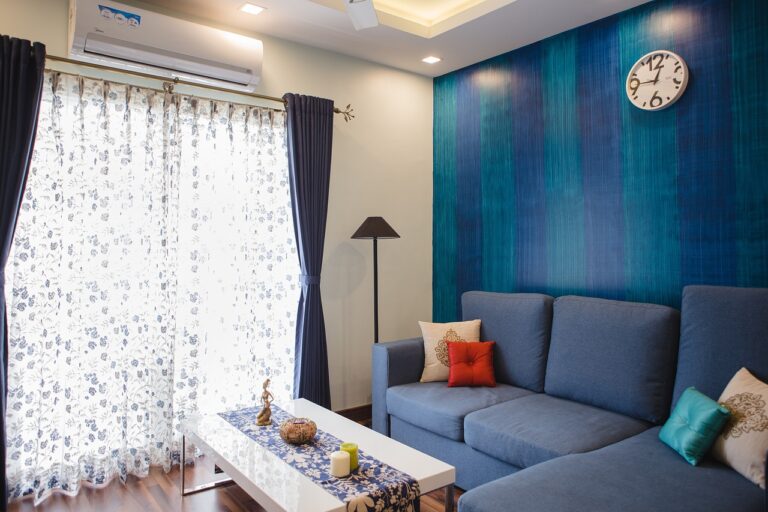The Importance of Good Ventilation in Home Design: Health and Comfort
Proper ventilation plays a vital role in maintaining a healthy and comfortable indoor environment. Without adequate ventilation, indoor air can become stagnant and trapped with pollutants, leading to a range of health issues. These pollutants can include dust, allergens, chemicals from cleaning products, and even carbon monoxide from appliances, all of which can pose serious risks to your well-being.
In addition to health concerns, poor ventilation can also impact the overall comfort of your home. Inadequate ventilation can result in unpleasant odors lingering in the air, increased humidity levels leading to mold growth, and a feeling of stuffiness throughout the space. Proper ventilation helps to remove these odors and excess moisture, creating a more breathable and pleasant atmosphere for you and your family.
• Proper ventilation is essential for maintaining a healthy indoor environment
• Without adequate ventilation, pollutants can become trapped in the air
• Pollutants such as dust, allergens, and chemicals can pose health risks
• Carbon monoxide from appliances can also be a serious concern
Proper ventilation not only impacts health but also affects the overall comfort of your home.
Inadequate ventilation can lead to unpleasant odors lingering in the air and increased humidity levels, which can result in mold growth.
Proper ventilation helps to remove odors and excess moisture, creating a more breathable and pleasant atmosphere for you and your family.
It is crucial to ensure that your home has proper ventilation systems in place to maintain both health and comfort.
Understanding the Impact of Poor Indoor Air Quality on Your Well-being
Indoor air quality plays a significant role in our overall well-being, affecting both our physical health and mental clarity. Poor air quality can lead to a range of health issues, such as respiratory problems, headaches, fatigue, and irritability. Breathing in pollutants, allergens, and other harmful substances can exacerbate existing conditions like asthma and allergies, making it crucial to ensure that the air we breathe indoors is clean and fresh.
Inadequate ventilation and the accumulation of pollutants can create a stale and stuffy environment within our homes, compromising our comfort and quality of life. Without proper circulation of fresh air, indoor spaces can become a breeding ground for mold, dust mites, and other allergens that can trigger allergies and worsen respiratory conditions. Investing in good ventilation systems and practicing regular air purifying techniques are essential steps in maintaining a healthy indoor environment to safeguard our overall well-being.
The Benefits of Fresh Air Circulation in Enhancing Overall Health
Fresh air circulation plays a crucial role in maintaining our overall health and well-being. When indoor spaces are properly ventilated, it helps to remove indoor air pollutants, such as dust, pet dander, mold spores, and other airborne particles that can trigger respiratory issues and allergies. By allowing fresh air to circulate, it helps to dilute and disperse these pollutants, creating a healthier environment for occupants.
Moreover, fresh air circulation can also improve cognitive function and productivity. Studies have shown that increased ventilation in indoor spaces can lead to better concentration, improved cognitive performance, and enhanced decision-making abilities. By ensuring proper ventilation in your home or workspace, you are not only promoting better physical health but also boosting mental clarity and overall productivity levels.
How does proper ventilation improve indoor air quality?
Proper ventilation helps to remove pollutants, allergens, and odors from the indoor air, leading to a cleaner and healthier living environment.
What are some common signs of poor indoor air quality?
Common signs of poor indoor air quality include stuffy or stale air, lingering odors, mold growth, and an increase in allergy or asthma symptoms.
How can fresh air circulation benefit overall health?
Fresh air circulation can improve respiratory function, boost the immune system, increase energy levels, and promote better sleep quality.
How often should I open windows or doors to circulate fresh air in my home?
It is recommended to open windows or doors for at least 5-10 minutes each day to allow for proper air circulation and ventilation.
Are there any specific plants or air purifiers that can help improve indoor air quality?
Yes, certain indoor plants such as peace lilies, spider plants, and aloe vera can help to filter out toxins and improve indoor air quality. Additionally, HEPA air purifiers can also be effective in removing airborne pollutants.







